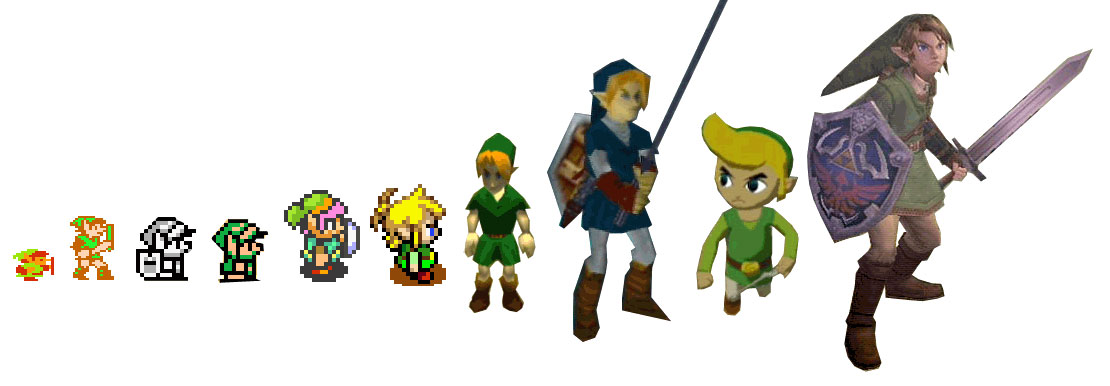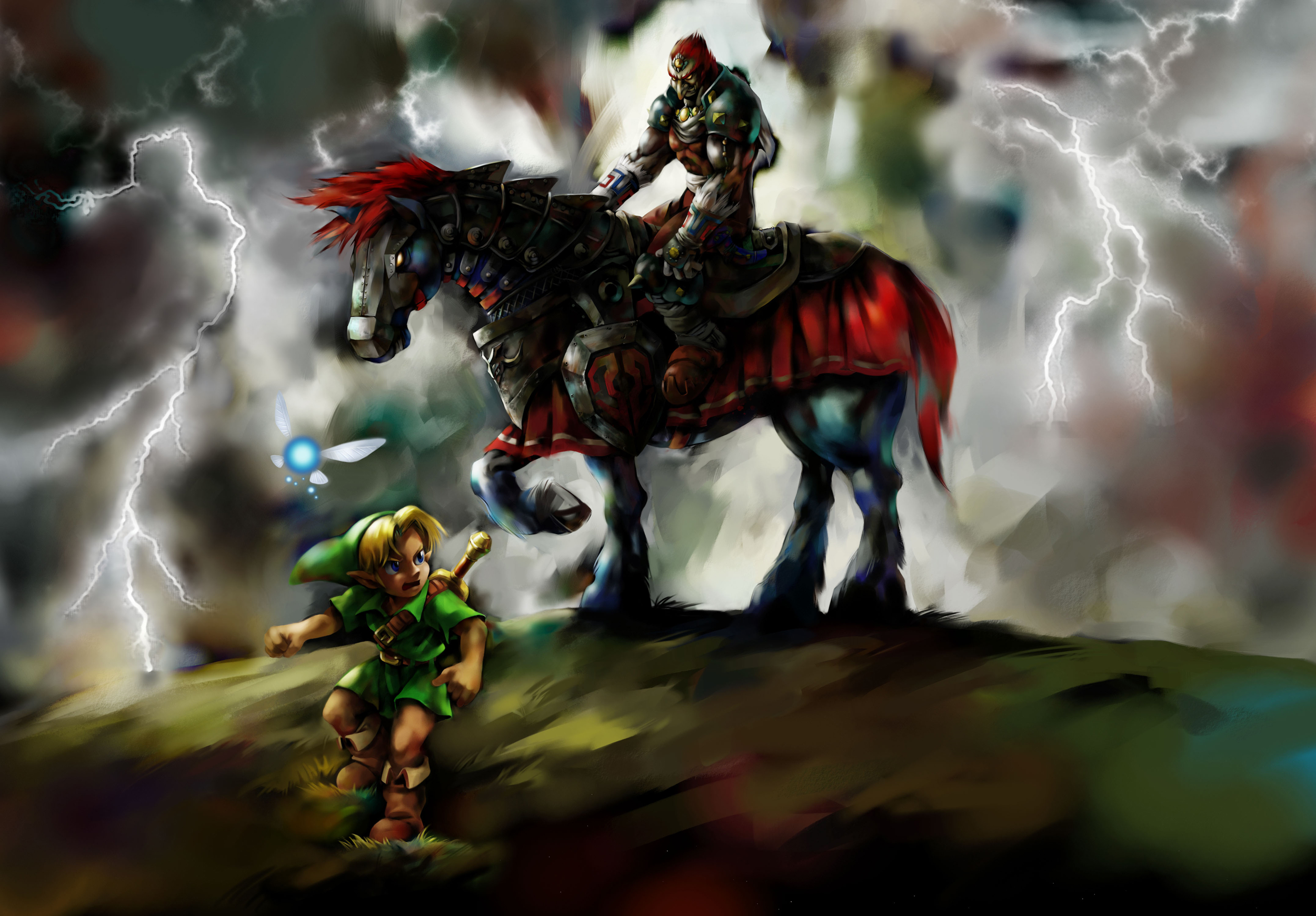The one thing that always irritated me about the Zelda series is that it's not a true RPG. The only game that had a levelling and experience system was Zelda 2,and that was considered the "bad" game. It's really an action adventure game. Other than that, I really like the idea of two dimensions. Although to give Link a talking voice and personality does destroy the immersive aspect, so I don't think they'll ever do it. If they did have the Dark Souls team develop a title and give them unlimited resources, I think they would have the defining role playing game of the century.
Time Gone Bye: Saying Good Day to Zelda
Some missing Links.

Link has jumped from one generation to the next while reinventing his style for saving princess Zelda with every iteration. Unfortunately, the most recent games have been much less groundbreaking than the golden age from the original through Ocarina of Time. Whereas the player had become accustomed to at least a few new mechanics and drastically different artistic styles between each installment, recently players have been fed mostly regurgitated ideas. Even so, the new technological capabilities of Nintendo’s 3DS and Wii U should provide plenty of new places to take the franchise.
Gamers have thus far been given plenty of choices on the 3DS virtual console, yet zero options that are new takes for the series on the platform. Even the recently announced and sequel to fan favorite A Link to the Past only has a few unique traits. Amazing as turning Link into living graffiti on dungeon walls may be, one gimmick is not enough for fans who crave Nintendo’s groundbreaking history. To be fair: there probably will be more features to fortify this as another classic entry in the series, but most Zelda games have followed the formula of one major gimmick added to each new installment -- shrinking in the Minish Cap; turning into a wolf in Twilight Princess, or a ghost in Phantom Hourglass; sailing in The Wind Waker; becoming a conductor for Spirit Tracks; changing the seasons in Oracle of Seasons and Ages; or even turning back time from the world’s end in Majora’s Mask. All of these games have been worthwhile and some of the best experiences in video games, but it still might be time to augment the formula for success. Mixing more than one dominant trait, with a few of these from past experiences, possibly through a Link who could call upon his predecessors for help, could juggle the abundance of untapped possibility at Nintendo’s disposal.

On their other platform, Nintendo has yet to show footage for their new Zelda title in development (that isn’t the HD remake of Wind Waker). So far we have only been able to find solace in Nintendo’s assurance that an entry is being developed for the Wii U. This news has evolved into a Zelda Miiverse on their console, so hopefully Nintendo can use the social foundation to add to the next title’s ingenuity.
If Nintendo would just take ideas from their devoted faithful, they could mesh plenty of untapped potential: some fans have pleaded for a grizzly, open world atmosphere akin to Demon’s Souls or Dark Souls. More fans have clamored for a larger world. Other fans have asked for an overhaul in combat. The fan inside me wants a shift in plot focus, and a few, proud fans have requested complete voice overs (including Link who has never spoken, except for groans, grunts, and other animalistic noises).
Hyrule, a little too small to be a kingdom. A quick fix: take the arcade styled combat of Zelda and add an influence of Elder Scrolls’ randomly generated dungeons and vast landscapes. Similarly, you’d have the choice to go wherever you want, at any moment, and go back to collect more valuables as you add improve your arsenal of weaponry. The developers could add an underworld to the atmosphere, which could include initially inaccessible areas to be conquered gradually throughout the game. To remember temporarily blocked areas, similar to those found in the Metroid franchise, the stylus on the 3DS and Wii U tablet could be used as a journal and map. Gigantic puzzles that incorporate large areas of the world would be an evolution from those mostly focused in one room of each dungeon.

As far as combat, other RPGs like the Souls franchise have utilized a more methodical approach of one trigger for raising a shield and another for heaving your sword. Even though the boss battles have always been wonderfully crafted, a few other additions could strengthen the gameplay. More RPG elements: as it stands, once you get items, rupees and bags, there’s not much more reason to fight, except to clean out a room. Some of the most devoted gamers have mentioned different sets of armor with specific qualities as a fun way to add an extra level of conceit to tinker with throughout the game. Mythical blacksmiths could forge new sets made for the hero, either complimenting whatever task could be at hand next or fortifying his defensive capabilities. This kind of deliberate approach through combat and gear -- never really attempted as such an integral part to the series -- could compliment a new direction in plot.
If we get past the mechanisms that fuel this series, the plot for console Zelda entries is undoubtedly as antiquated as the first Hylians. Understandably, this tale is one of the most classic renditions of a knight rising up to save the princess from perilous evil. Nevertheless, some of the simplistic purity should be thrown out for at least one entry. We would see what happens when fully developed characters enter into the fold. Rounding out the characters as more relatable and personable than ever before could happen with trinkets from previous heroes and mysterious journal entries scattered throughout Hyrule. The clues could be laid in front of the player as a kind of scavenger hunt, in addition to a progression of relationships that mainly happens at the beginning of each installment to help players grasp the controls while knocking out the backstory.
Go back to the moment just after Ocarina, when the hero gets fractured into two histories. This link between Ocarina, at the back end of its story, and when the hero both becomes triumphant over and defeated by Ganondorf in alternate histories, has not been explicitly talked about enough in any Zelda game. Defeated, Hyrule declines while Ganon is resurrected and the Imprisoning War begins in A Link to the Past. Triumphant, Link’s legacy lives on for generations while the Sacred Realm remains protected, from Majora’s Mask through the twilight realm. Finally, a second history of when the hero is triumphant opens as the hero of winds (The Wind Waker) is born. In total, three histories fracture from the most pivotal moment in the series.

A game needs to be made to canonize the most timeless event in Hyrule’s history. It could be called something like The Legend of Zelda: The Hero of Time. For this game, an extreme amount of possibilities with almost limitless creativity would flow. Instead of space, the game would take place within time. The Hero of Time could metaphorically set its story on a clock, with anthropomorphized numbers for each of the levels. Ultimately, Link would face against the essence of time itself. Since everything is fractured in both triumph and defeat, you’d suddenly have to play through it a second time after it seemed like you’d finished the game. The player would begin to see a happy ending, only to be subverted with a warp to a defeated dimension. Opposite versions of each level would be like a pseudo dark world, where every numbered world would need to be nursed back to life, could provide the tension for another half of a game. This half could be played similarly to Okami, because the hero brings the world back to life wherever he runs, due to a kind of life force being emitted from his tracks.
So much creativity is waiting to burst from the seams within an already classic tale. The legend of the franchise implicitly embraces branching paths in plot, so it could become a great development if these tweaks to an already great formula were made. In fact, Nintendo could make a story of how Link has been muted or chosen to become a mute in one branching path, while his scholastically oratory skills could be emphasized in another. With more options to speak, Link would also be more readily available for more exercises in wit than ever before. Especially in his early days of training, puzzles that tease the brain with how to manage relationships could breathe life into the first third of the next Zelda game.
It’s about time for Link to have the option to talk back. I know that I won’t want him to talk, but many others do. The Skull Kid knows that we’ve all been listening. Like Tom Sawyer and Huckleberry Finn, most of us faithful have signed some kind of pact that says:
they will keep mum
about This and They
wish They may Drop
down dead in Their
Tracks if They ever
Tell and Rot.
Well, mum has been the word about Link’s voice for so long. The fans have been so generous. So listen: it’s not like we’d be committing murder by experimenting with the voice of the series. It may not be for everybody, but options like these and showing us that the developers still want to innovate with the Legend of Zelda will make everybody happy.



Comments